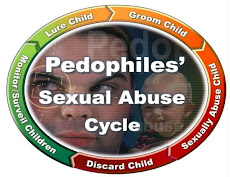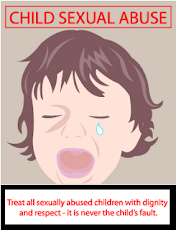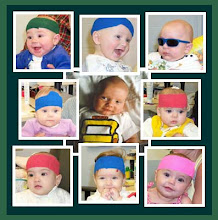CHILDREN SUXUAL ABUSE SERIAL CASE
Provided by
DR WIDODO JUDARWANTO
DR WIDODO JUDARWANTO
FIGHT CHILD SEXUAL ABUSE AND PEDOPHILIA
Yudhasmara Foundation
JL TAMAN BENDUNGAN ASAHAN 5 JAKARTA PUSAT, JAKARTA INDONESIA 10210
PHONE : (021) 70081995 – 5703646
email : judarwanto@gmail.com,
http://pedophiliasexabuse.blogspot.com/
Yudhasmara Foundation
JL TAMAN BENDUNGAN ASAHAN 5 JAKARTA PUSAT, JAKARTA INDONESIA 10210
PHONE : (021) 70081995 – 5703646
email : judarwanto@gmail.com,
http://pedophiliasexabuse.blogspot.com/
- Doe v. Creighton, 439 Mass. 281, 786 NE2d 1211 (2003). "A plaintiff who brings suit beyond the normal statutory limitations period may not reach a jury simply by presenting evidence that sexual abuse took place. In order to survive a motion for summary judgment in those circumstances, a plaintiff must show that the nature of the abuse was such that it would cause an objectively reasonable person to fail to recognize the causal connection between it and the injuries that it caused."
Flanagan v. Grant, 79 F.3d 1 (1st Cir., 1996) "Discovery rule" applied when determining when daughter's cause of action accrued against parents. Court determined that daughter had sufficient notice that sexual abuse by father caused psychological harm more than 3 years before she brought action and therefore was barred by statute of limitations.
Guertin v. McAvoy, 19 Mass. Law Reporter 194 (2005). "Statute tolling any applicable limitations period for sexual abuse of a minor claims until the plaintiff is able to discover a link between a claimed psychological injury and the claimed sexual abuse applies to an inability to link caused by any reason, not just by repressed memory."
Hoult v. Hoult, 792 F.Supp. 143 (D. Mass., 1992) The court held the "discovery rule" did extend to tort claims by victims of incest who have no memory of the sexual abuse until after the expiration of the statute of limitations. - Koe v. Mercer, 450 Mass. 97 (2007). Once a plaintiff knows of the connection, the statute of limitations begins to run, even if he does not know the "full extent or nature of [the] injury."
- Legaski v. Melanson, 2 Mass. Law Reporter 614 (1994) This action is based on suppressed memory recall. The statute of limitations begins to run when the plaintiff discovers the defendant's conduct was the cause of her psychological condition.
- Phinney v. Morgan, 39 Mass. App. Ct. 202, 654 NE2d 77 (1995) review denied 421 Mass. 1104, 656 NE2d 1258 (1995) The adult plaintiffs claimed they were harmed by their mother's failure to protect them from their father's sexual abuse while they were minors. The court did extend the "discovery rule" to non-perpetrators but concluded plaintiffs were still time barred.
- Riley v. Presnell, 409 Mass. 239, 565 NE2d 780 (1991) The court decided that the statute of limitations does not begin to run until the plaintiff knows or reasonably could have known that he may have suffered injury due to the psychotherapist's conduct (discovery rule). The question of when a plaintiff should have known about his cause of action is one of fact.
- Ross v. Garabedian, 433 Mass. 360, 742 NE2d 1046 (2001). More than thirty years after allegedly being abused by a priest, plaintiff brought this action. Superior Court granted summary judgment to the defendant, since more than three years had passed. The Supreme Judicial Court held that there was a triable issue of fact as to whether the plaintiff knew both that the incidents had occurred and that they had caused him harm.
Shahzade v. Gregory, 930 F.Supp. 673 (D. Mass., 1996) "Discovery rule" applies to tort claims brought by victims of sexual abuse whose memories of such abuse have been repressed until after the statute of limitations has run.
Szymczuk v. Szymczuk, 5 Mass. Law Reporter 101 (1996) A claim for sexual abuse of a minor is governed by the statute of limitations in effect when the injury was first discovered rather than when the injury occurred.
REFERENCES :
- Massachusetts Statutes
- Chapter 260 sec. 2A: Statute of Limitations for Tort Actions
- Chapter 260 sec. 4C: Statute of Limitations for Sexual Abuse of Minors (Civil Cases)
- Abuse in the Family, MCLE, 1994.
- Domestic Torts: Family violence, conflict and sexual abuse, rev. ed., Thomson West, 2005.
"Forging the Causal Link: Reasonable Delay in Commencing Action for Childhood Sexual Abuse," by Susan M. Basham, 27 Suffolk University Law Review 749 (1993).
"Limitation of Actions," 51 Am. Jur. 2d Limitation of Actions § 151.
"Running of Limitations Against Action for Civil Damages for Sexual Abuse of Child," 9 ALR5th 321. - State by State Survey of Statutes of Limitation Applicable to Civil Claims of Childhood
- Sexual Abuse," by Susan K. Smith. Companion article entitled "Civil Remedies for Victims of Sexual Abuse" can also be accessed at this web site.
.jpg)









.png)

Tidak ada komentar:
Posting Komentar